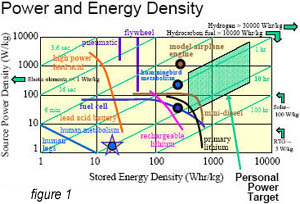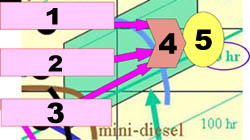Current Status
| The functionality and performance of devices that enhance autonomous human mobility, monitoring, and communication are growing rapidly, and power sources to energize these mobile systems are critical to supporting this growth. Unfortunately, the methods available for powering these devices are not equally advanced. Personal autonomy, through portable networks, computation and communication, hand-held or hand-launched robotic devices, artificial organs, and exoskeletal systems, still requires new compact power sources. | |||||
|
|
||||
Contact Personal Power
Systems:
100 Engineering Gateway University of California, Irvine, Irvine, California 92697-2625
pps@uci.edu
949-824-8745
100 Engineering Gateway University of California, Irvine, Irvine, California 92697-2625
pps@uci.edu
949-824-8745
 Click for Detailed Version
Click for Detailed Version Click for Detailed Version
Click for Detailed Version